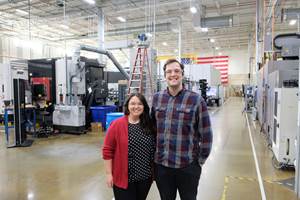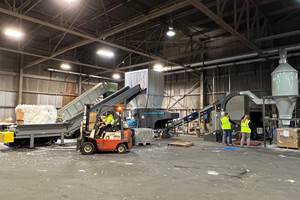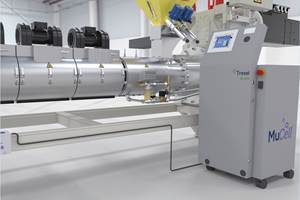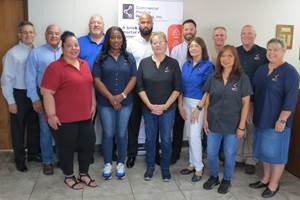New Plastics Recovery Facility To Open in Baltimore
One of the biggest barriers to increasing recycling rates is a lack of infrastructure.
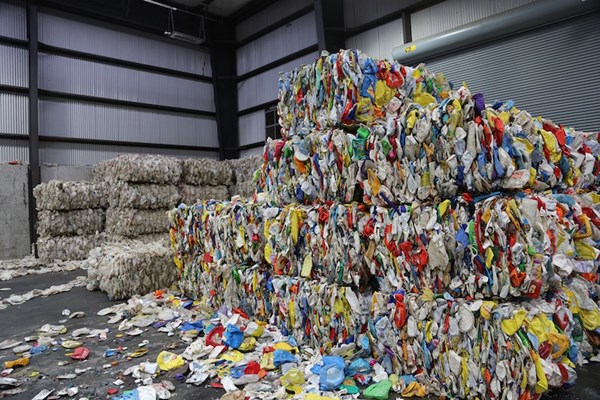
One of the biggest barriers to increasing recycling rates is a lack of infrastructure. In 2013, lack of recycling infrastructure caused U.S. cities to collectively spend over $5 billion dollars to landfill over $11 billion worth of commodities that could have been recycled, according to Closed Loop Fund, which is a consortium aimed at providing municipalities access to zero- and low-interest loans to build comprehensive recycling programs. Partners include big corporations such as 3M, Coca-Cola, Colgate-Palmolive, Goldman Sachs, Johnson & Johnson Family of Consumer Companies, Keurig Green Mountain, PepsiCo and the PepsiCo Foundation, Procter & Gamble, Unilever, Walmart and the Walmart Foundation.
The fund plans to invest $100 million in the U.S. recycling infrastructure by 2020.
Closed Loop Fund’s first investee is a joint venture between QRS and Canusa- Hershman (CHR) to create what it calls a “one-of-a-kind” Plastic Recovery Facility (PRF) in Baltimore.
Currently, 40% of communities across the U.S. are not able to collect and recycle #3 - #7 plastics. QRS and CHS will combine technology that can both separate these products and turn them back into raw materials for new products and packaging. The facility is able to process 4,500 tons of materials every month – double the capacity of what’s presently possible in the U.S. The group believes that this will help drive significant increase in recovery of hard-to-recycle plastics and ensure a stable market.
Beginning in November, QRS-CHR will service the majority of the East Coast – from Maine to South Carolina. The opening of the facility is expected to help divert 440,000 tons from landfills and reduce 555,000 tons of greenhouse gas emissions. Closed Loop Fund says that QRS-CHR is a business model that can be replicated across the U.S. and beyond.
"QRS-Canusa's newest Plastic Recovery Facility in Baltimore provides all communities and recyclers throughout the Northeast and Mid-Atlantic regions with a reliable, domestic processing solution for mixed, post-consumer plastic containers,” said Greg Janson, CEO of QRS. “Working in conjunction with other QRS facilities, the Baltimore PRF targets virtually all polymers in the single stream mix for recovery, returning high volumes of quality material to the manufacturing base. This purpose nests perfectly with the mission of the Closed Loop Fund and we are excited for their support of the project."
Additional investments
Closed Loop Fund’s two other investments are in Quad Cities, Iowa, and Portage County, Ohio. These investments will allow the two communities to convert from dual stream recycling systems to single stream, making it easier for citizens to recycle and significantly increasing recycling rates. Again, Closed Loop says that the funding will prove models that help expand single stream recycling to similar communities across the country.
Over the next 10 years, in Portage County alone, 37,000 tons will be diverted from landfills with a reduction of 110,000 tons of greenhouse gas emissions. Quad Cities is expected to see 86,000 tons diverted from landfills and 250,000 tons of greenhouse gas emissions reduced.
“We’ve spent months reviewing proposals from cities and recycling facilities that have the potential to transform recycling systems across the country,” said Rob Kaplan, co-founder and managing director of Closed Loop Fund. “We know that when done right, recycling is a profitable business that can save city and taxpayer money. That’s why Closed Loop Fund invests in business models like QRS-Canusa, Quad Cities and Portage County that solve key bottlenecks in the recycling system, create economic value for cities, and make recycling more accessible for citizens.”
Closed Loop Fund has pretty big goals. By 2025, it aims to do the following:
- Reduce greenhouse gas emissions by more than 50 million GHG tons reduction
- Divert more than 20 million cumulative tons of waste from landfills
- Create 20,000+ local jobs across the U.S.
- Save nearly $1.2 billion for American cities
- Prove replicable models that will help unlock additional investment in recycling.
Related Content
Scaling Up Sustainable Solutions for Fiber Reinforced Composite Materials
Oak Ridge National Laboratory's Sustainable Manufacturing Technologies Group helps industrial partners tackle the sustainability challenges presented by fiber-reinforced composite materials.
Read MorePurpose-Built System Enhances Capacity and Flexibility for Recycler
A Boston recycler invested in a turnkey shredding, granulation and elutriation system to expand its plastics reclaim business.
Read MoreFoam-Core Multilayer Blow Molding: How It’s Done
Learn here how to take advantage of new lightweighting and recycle utilization opportunities in consumer packaging, thanks to a collaboration of leaders in microcellular foaming and multilayer head design.
Read MoreInside the Florida Recycler Taking on NPE’s 100% Scrap Reuse Goal
Hundreds of tons of demonstration products will be created this week. Commercial Plastics Recycling is striving to recycle ALL of it.
Read MoreRead Next
For PLASTICS' CEO Seaholm, NPE to Shine Light on Sustainability Successes
With advocacy, communication and sustainability as three main pillars, Seaholm leads a trade association to NPE that ‘is more active today than we have ever been.’
Read MoreLead the Conversation, Change the Conversation
Coverage of single-use plastics can be both misleading and demoralizing. Here are 10 tips for changing the perception of the plastics industry at your company and in your community.
Read More


















